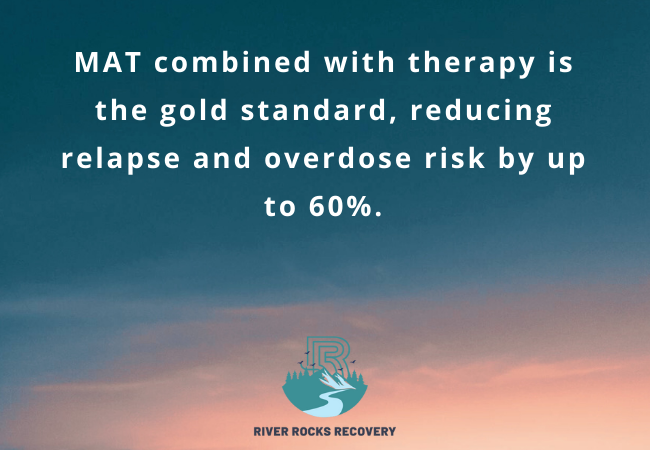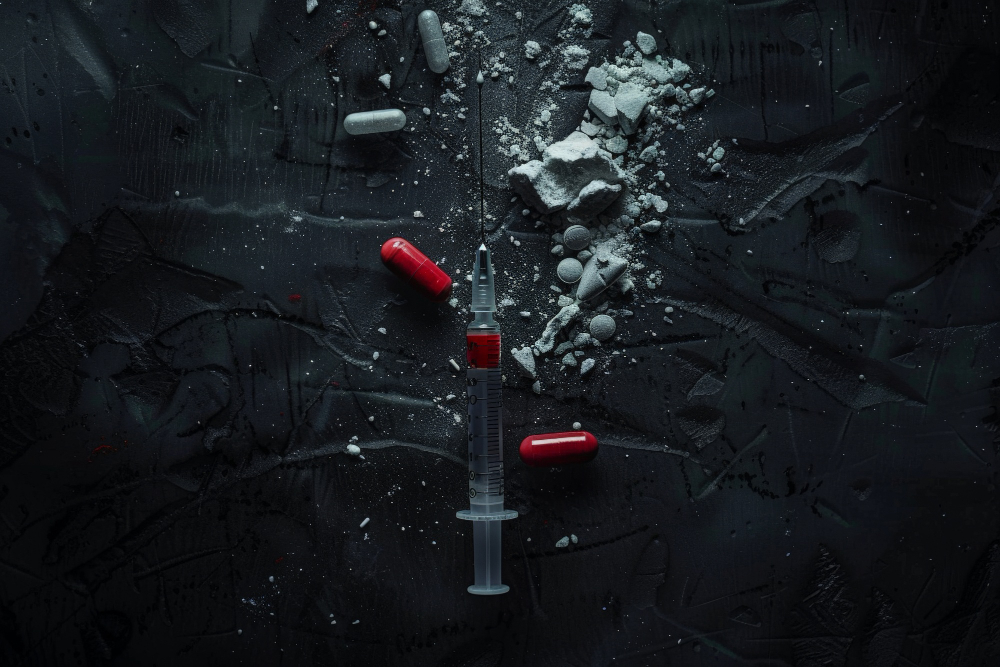Opiate addiction is a nationwide crisis—and Ohio is at the center of it. From heroin to fentanyl to prescription painkillers, opiate misuse has taken a devastating toll on individuals, families, and communities. But for every person battling opioid use disorder (OUD), there is hope. Recovery begins with understanding the withdrawal process and having the right professional support.
Opiate withdrawal is not just uncomfortable—it can be overwhelming, debilitating, and even dangerous without help. That’s where rehab centers play a vital role. At River Rocks Recovery, we offer structured, compassionate, and evidence-based care through our Opiate Rehab Treatment in Ohio, including Partial Hospitalization, Intensive Outpatient Programs, and Outpatient Programs, all designed to guide clients safely through withdrawal and toward long-term recovery.
In this blog, we’ll explore what opiate withdrawal really looks like, why rehab support is essential, and how Addiction Treatment Programs in Ohio like ours help you move from suffering to strength—step by step.
Understanding Opiate Withdrawal: What’s Happening in the Body?
Opiates (or opioids) bind to specific receptors in the brain that control pain, pleasure, and mood. When someone uses opiates repeatedly, the brain reduces its natural production of endorphins and becomes reliant on the drug to function normally. Once the substance is removed, the body goes into withdrawal—a state of physical and psychological distress as it recalibrates.
Common Opiate Withdrawal Symptoms:
- Restlessness, agitation, and anxiety
- Muscle aches, cramps, and body pain
- Nausea, vomiting, and diarrhea
- Excessive sweating and chills
- Dilated pupils and watery eyes
- Runny nose and yawning
- Rapid heartbeat and high blood pressure
- Insomnia and fatigue
- Depression and mood swings
- Intense cravings for opioids
Withdrawal Timeline:
- 6–12 hours after last dose: Early symptoms begin (anxiety, muscle aches)
- 24–72 hours: Peak symptoms (cramps, nausea, insomnia, cravings)
- 4–10 days: Gradual symptom decrease, lingering fatigue or depression
- Weeks to months: Psychological symptoms (cravings, anxiety, depression) may persist—this is known as post-acute withdrawal syndrome (PAWS)
Why Opiate Withdrawal Feels Impossible Without Help
Unlike some substances, opiate withdrawal does not typically cause seizures or death—but that doesn’t mean it’s safe to go it alone. The physical discomfort is often so intense that many individuals relapse simply to relieve symptoms. The psychological distress can lead to suicidal thoughts, risky behavior, and a sense of hopelessness.
Major Challenges:
- Cravings and triggers are overwhelming
- Severe depression can lead to self-harm or relapse
- Fear of symptoms keeps many from even trying to quit
- Lack of medical care during detox increases suffering
- Unsafe environments sabotage early recovery attempts
In fact, studies show that 80–90% of people who try to quit opioids cold turkey relapse within the first week—often with a higher risk of overdose.
The Role of Rehab Centers in Overcoming Opiate Withdrawal
Professional rehab centers don’t just manage symptoms—they transform lives. At River Rocks Recovery, our team creates a safe, structured environment where clients can detox, stabilize, and begin rebuilding their lives with expert support at every stage.
Here’s how rehab plays a crucial role in successful withdrawal and long-term healing:
1. Supervised Medical Detox and MAT (Medication-Assisted Treatment)
While we coordinate detox services with partner providers, we help each client access the right level of support for safe withdrawal.
- MAT medications like buprenorphine, Suboxone, or methadone can ease symptoms, reduce cravings, and support early recovery
- 24/7 supervision ensures medical complications are addressed promptly
- Nutritional support and hydration help replenish the body
- Comfort medications ease symptoms like nausea, insomnia, and anxiety
2. Comprehensive Behavioral Therapy and Trauma Care
Detox is only the beginning. At our Addiction Treatment Center in Ohio, we treat the emotional, cognitive, and behavioral roots of addiction through personalized therapy.
- Cognitive Behavioral Therapy (CBT): Reshape thought patterns that lead to drug use
- Dialectical Behavior Therapy (DBT): Build emotional regulation and distress tolerance
- Trauma-Informed Therapy: Process unresolved trauma, a major relapse trigger
- Relapse Prevention Education: Identify high-risk situations and develop responses
- Mindfulness and holistic therapies: Yoga, breathwork, journaling, and more
These therapies are integrated into all levels of care—from Partial Hospitalization Program in Ohio to Intensive Outpatient Program in Ohio and continuing through outpatient and aftercare.
3. Dual Diagnosis Support: Mental Health and Opiate Addiction
Many individuals with opioid use disorder also struggle with mental health conditions like:
- Major depression
- Anxiety disorders
- PTSD
- Bipolar disorder
- Personality disorders
At River Rocks Recovery, we offer dual diagnosis treatment—simultaneously treating addiction and mental health with:
- Psychiatric evaluation
- Medication management
- Integrated therapy plans
- Trauma-informed support
Failing to treat co-occurring disorders is one of the top causes of relapse, making this a critical component of successful recovery.
4. Structured Daily Routine and Safe Environment
In early recovery, structure is everything. Rehab centers provide a daily schedule that fosters consistency, routine, and accountability.
At River Rocks Recovery:
- Clients follow a therapeutic schedule with group sessions, individual therapy, and wellness activities
- There’s no access to drugs or alcohol, reducing temptation
- We create a supportive, substance-free community where healing can thrive
- Clients are surrounded by people who understand, not judge
This structure is essential for those completing Meth Rehab Treatment in Ohio or Opiate Rehab Treatment in Ohio, where cravings and post-withdrawal depression are high.

5. Outpatient and Step-Down Programs to Prevent Relapse
After detox and stabilization, clients often feel tempted to return to “normal life”—but without continued care, relapse becomes far more likely. That’s why we emphasize step-down levels of care through our:
- Partial Hospitalization Program in Ohio (PHP): Full-day care, 5 days a week, for those who need structure but don’t require residential treatment
- Intensive Outpatient Program in Ohio (IOP): 3–5 days a week, part-time care for clients balancing recovery with work or family
- Outpatient Program in Ohio (OP): 1–2 therapy sessions per week for maintenance support
This continuum allows clients to build confidence, apply coping skills, and gradually reintegrate into life while maintaining a safety net.
6. Life Skills, Purpose, and Aftercare Planning
Long-term success in recovery depends on more than sobriety—it depends on rebuilding a meaningful life.
At River Rocks Recovery, we help clients:
- Set personal and professional goals
- Rebuild relationships and social connections
- Learn financial and job-readiness skills
- Find purpose through volunteerism, career support, or education
- Connect to peer support groups and aftercare resources
Recovery is a lifestyle—not a one-time event. We empower every client to build a future they’re excited to live.
Why River Rocks Recovery for Opiate Withdrawal and Rehab in Ohio?
At River Rocks Recovery, we treat more than symptoms—we treat people. Our specialized approach to Opiate Rehab Treatment in Ohio combines medical, psychological, emotional, and social healing. We understand that withdrawal is only the beginning—and we’re here for every step after that.
What You’ll Find at Our Center:
- Personalized addiction treatment plans
- Trauma-informed, dual diagnosis care
- Flexible levels of outpatient care (PHP, IOP, OP)
- Relapse prevention, coping skills, and life coaching
- A compassionate, experienced team who genuinely cares
Whether you’re looking to start recovery for yourself or someone you love, River Rocks Recovery is a place of hope, structure, and sustainable change.
Conclusion
Opiate withdrawal can feel like an impossible mountain to climb—but you don’t have to climb it alone. With the right support, medical care, and therapeutic environment, you can get through the pain and into a new life filled with clarity, confidence, and freedom.
At River Rocks Recovery, we help you safely detox, process your pain, and rediscover your purpose. The hardest part is asking for help—and that’s where healing begins. Call 888-905-6281 today for a confidential assessment. Let’s take that first step—together.
FAQ on
What are the symptoms of opiate withdrawal?
Opiate withdrawal symptoms include muscle aches, nausea, insomnia, sweating, anxiety, diarrhea, and strong cravings. Symptoms can begin within 6–12 hours after the last use and may last several days.
Can opiate withdrawal be dangerous?
While opiate withdrawal is rarely life-threatening, it can be physically and emotionally intense. Without medical supervision, complications like dehydration, severe depression, or relapse can occur.
How does a rehab center help with opiate withdrawal?
Rehab centers provide medical supervision, medication-assisted treatment (MAT), therapy, and emotional support to reduce withdrawal symptoms and prevent relapse.
What medications are used in opiate withdrawal treatment?
Medications like buprenorphine, Suboxone, and methadone are commonly used to ease withdrawal symptoms and reduce cravings. These are often part of a Medication-Assisted Treatment (MAT) program.
Is long-term support available after withdrawal?
Yes. We provide aftercare planning, relapse prevention strategies, alumni groups, and access to continuing therapy through our Addiction Treatment Program Ohio to support lifelong sobriety.




























